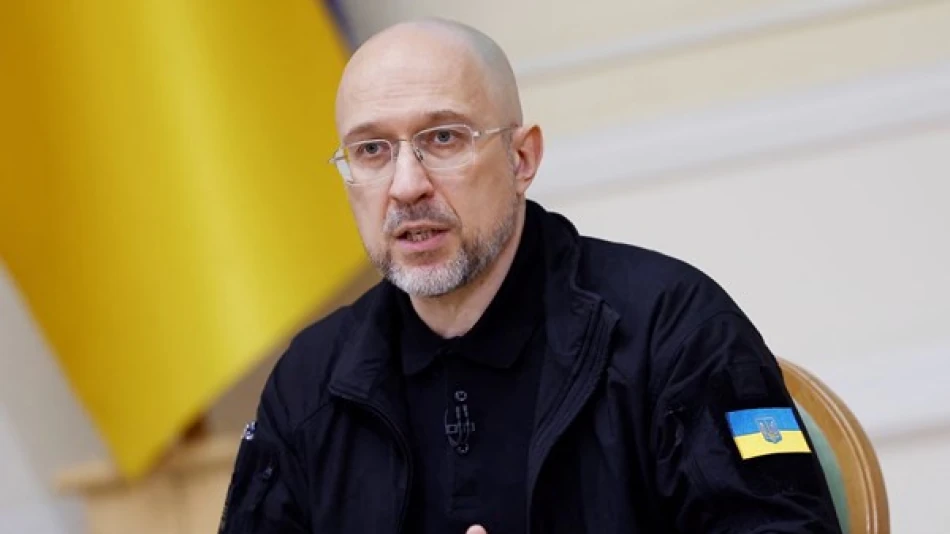
Zelensky Nominates Prime Minister for Defense Minister Role
Zelensky Reshuffles War Cabinet: Prime Minister Shmyhal Tapped for Defense Ministry
Ukrainian President Volodymyr Zelensky has proposed a significant government reshuffle that would see current Prime Minister Denys Shmyhal transition to Defense Minister, while elevating Deputy Prime Minister Yulia Svyrydenko to lead the government. The move signals a strategic pivot in Ukraine's leadership structure as the war enters its third year, prioritizing economic expertise in both civilian and military planning.
A Crisis-Tested Leader Takes the Pentagon
In his evening address Monday, Zelensky emphasized that Shmyhal's "vast experience will certainly be useful as Defense Minister." This isn't merely political reshuffling—it's a calculated decision to place someone with proven crisis management skills at the helm of Ukraine's military apparatus.
Shmyhal, who has served as Prime Minister since 2020, successfully navigated Ukraine through the COVID-19 pandemic before facing the far greater challenge of wartime economic management following Russia's February 2022 invasion. His tenure has been marked by maintaining government functionality under extreme duress, coordinating international aid, and managing Ukraine's wartime budget—skills directly transferable to defense leadership.
Strategic Implications for Ukraine's War Effort
Economic Warfare Expertise
The appointment reflects modern warfare's increasingly economic dimension. Shmyhal's background in managing Ukraine's finances during wartime gives him unique insight into resource allocation, international procurement, and the industrial mobilization crucial for sustained military operations. Unlike traditional military appointments, this choice prioritizes logistical and economic warfare capabilities.
Continuity in Crisis Management
Current Defense Minister Rustem Umerov is expected to become Ukraine's ambassador to the United States, a role that positions him to continue securing military aid from Ukraine's most crucial ally. This isn't a demotion but rather a strategic redeployment of talent where it's most needed—maintaining the Washington pipeline that has delivered over $100 billion in assistance.
Parliamentary Approval and Political Dynamics
The proposed changes require parliamentary approval, which appears likely given the legislature's consistent support for Zelensky since the war began. Ukraine's political unity during wartime has been remarkable compared to the fractious pre-war period, and this reshuffle is unlikely to break that pattern.
Yulia Svyrydenko's elevation to Prime Minister would make her one of the most prominent female leaders in wartime government globally. Her economic background—she previously served as Economy Minister—suggests continuity in Ukraine's market-oriented approach even as the country fights for survival.
International Precedents and Implications
This type of civilian-to-military leadership transition has historical precedents during major conflicts. The appointment mirrors how wartime governments often prioritize managerial competence over traditional military credentials, recognizing that modern defense leadership requires as much economic acumen as strategic thinking.
For international partners, particularly in NATO countries, Shmyhal's appointment may actually inspire confidence. His track record of working with international institutions and managing complex aid packages could streamline military cooperation and procurement processes that have sometimes been bureaucratically challenging.
Market and Investor Perspective
From an economic standpoint, this reshuffle suggests Ukraine is preparing for a prolonged conflict requiring sophisticated resource management. Shmyhal's move to Defense could signal more efficient military spending and better integration of economic planning with military strategy—factors that could influence international lending decisions and reconstruction planning.
The continuity represented by promoting from within, rather than bringing in outsiders, may reassure international partners about Ukraine's institutional stability even amid ongoing warfare. This stability is crucial for maintaining the international financial support that keeps Ukraine's economy functioning.
Most Viewed News

 Layla Al Mansoori
Layla Al Mansoori






